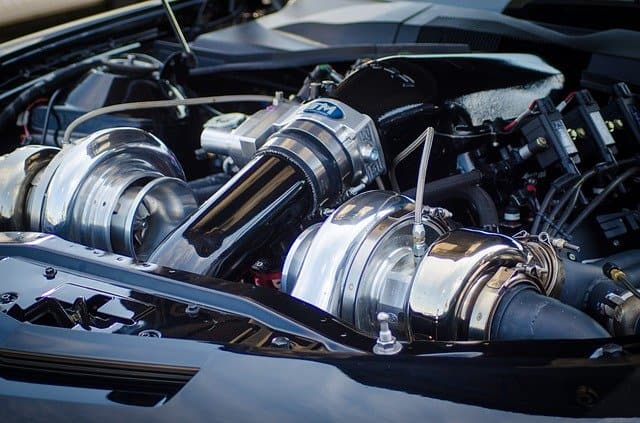Table of Contents
What You Should Know About Turbocharged Engines
Turbocharged engines are a bit different that normal naturally aspirated engines. Turbocharged engines use forced induction to force air into your engine, increasing the power output significantly. Because air is forced into turbocharged engines they have to be built to handle those increased internal pressures.
But what else is different about turbocharged engines? What else should you know if you are planning on buying a car with a turbocharged engine?
1. Expect To Pay More On Insurance
Having a car with a turbocharged engine will likely mean that you will pay a higher insurance premium when compared to a similar naturally aspirated car or non-turbo car. Why is this? Well, turbocharged cars will typically be categorized in the sports car category which is likely to increase your insurance. If you buy a Subaru Impreza WRX which is turbocharged you can expect to pay more for insurance than if you bought a regular Subaru Impreza.
This also comes down to the price of the vehicle. Having a turbocharged engine car will increase the overall cost of the vehicle. Your insurance rates will be tied to the amount that the car is worth and the insurance company has to insure.
2. They Perform Well At High Altitude
You may or may not know but engine performance is affected by the altitude at which you are at. If you live in a high altitude area a naturally aspirated engine will lose performance because it has to suck in more air to be able to provide the same level of horsepower output than it would at a lower altitude. This ultimately means that you lose horsepower as you climb in altitude with a naturally aspirated engine.
If you live in a high altitude area you may be pleasantly surprised that turbocharged engines will actually produce more power at high altitudes.
According to BorgWarner, a turbocharger manufacturer “The high-altitude performance of a turbocharged engine is significantly better. Because of the lower air pressure at high altitudes, the power loss of a naturally aspirated engine is considerable.” However, In contrast, the performance of the turbine improves at altitude as a result of the greater pressure difference between the virtually constant pressure upstream of the turbine and the lower ambient pressure at outlet.”
3. Expect to Pay For Premium Fuel
Most turbocharged engines will require the use of premium gasoline. If you don’t want to spend the extra amount of money every fill-up over regular gasoline then I would stick with a non-turbocharged car. Having a turbocharged engine will increase the likelihood of engine knock because of the increased pressures within the engine. To help with this premium fuel is used as the higher the octane of gasoline the lower chances for engine knock and misfires.
4. Turbocharged Cars Can Get Better Gas Mileage As Long As….
You may or may not know that turbocharged cars can provide better gas mileage than a comparable naturally aspirated car. This is because air is being forced into the engine of the car which allows the engine to breath better, increasing gas mileage and the efficiency of the engine at low RPMs.
However, if you always have your engine at high RPMs and in boost all of the time this will actually decrease your gas mileage and the engine will use more fuel. The fact is the more you have your engine at higher RPMs the more gasoline it will consume. It’s ultimately down to how you drive if you can expect to see an increase in gas mileage by going to a turbocharged engine.
If you are interested in how you can get better gas mileage out of your car then check out my other article 12 tips to increase your MPG.
5. Turbochargers and Towing
Turbocharging an engine will increase the amount of horsepower that the engine can produce while also increasing the torque output. For towing torque is more important than horsepower because torque is what is used to get whatever you are towing moving from a standstill. While most people know what horsepower is you may not know what torque is.
According to Wikipedia “Torque, moment, moment of force or “turning effect” is the rotational equivalent of linear force.[1] “
The more torque you have the better the vehicle will be at towing heavy loads. What you may not know is that turbocharged engines typically will have higher torque values over horsepower because of the increased boost provided by the turbocharger.
For example, the 2019 Ford F250 Powerstroke diesel has a 6.7L engine putting out an impressive 450 horsepower at 2800 RPM. What is even more impressive is that it puts out a staggering 935 ft-lbs of torque at 1800 RPM.
6. Turbocharged Engines Are Less Reliable
While turbocharged engines are designed to withstand more internal pressure than a naturally aspirated engine they also have more parts than a naturally aspirated engine. The more parts that you have the more chance for something to go wrong.
This doesn’t mean that there aren’t outlier engines that with regular maintenance didn’t have any real issues over 200k miles. It really comes down to having more moving parts connected to your engine and the extra forces that come with turbocharging an engine.
7. They Are Smaller Internally
Turbocharged engines will typically have a lower overall internal size than compared to a naturally aspirated engine with the same horsepower figures. This is because with turbocharged engines vehicle manufacturers are able to extract more horsepower from smaller engines. This, in turn, means that they can use smaller engines which also has the added benefit of reducing weight.
8. Turbocharged Engines Require More Maintenance
Having more engine parts also means more maintenance. The additional maintenance will be related to the added turbocharger and would include more frequent oil and spark plug changes.
Turbochargers can also go out over time and will cost about $1,000 to replace. Added intercoolers will also require maintenance to keep the additional coolant clean and fluids fresh. Additional coolant piping from the additional intercoolers can also start to fall apart over time which would also require additional costs to be replaced.
9. They Are More Efficient
Turbocharged engines are more efficient than a naturally aspirated engine. An engine with a turbo is effectively having additional air pumped into the engine to compress the air within the engine cylinders allowing the engine to produce more power overall.
If you drive a turbocharged car normally you should notice an increase in gas mileage when compared to a similarly equipped non-turbocharged car. However, most people that buy a turbocharged car won’t be interested in driving efficiently.
10. Reduced Emissions
As I mentioned above turbocharged engines will typically be smaller internally than their naturally aspirated counterparts. This also means that turbocharged engines will output fewer emissions than a comparable naturally aspirated engine.
Think about how much more pollution a large V8 engine would be putting out when compared to a smaller turbo V8 engine at idle and at cruising speed. The larger the engine the more emissions will be output.
Sources:
http://www.turbos.bwauto.com/en/products/turbochargerAdvantages.aspx

